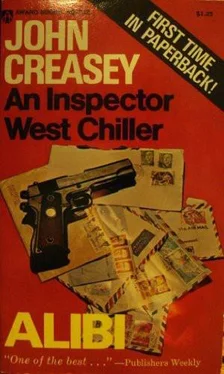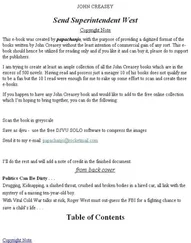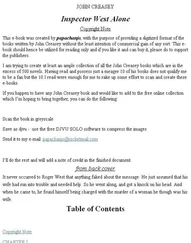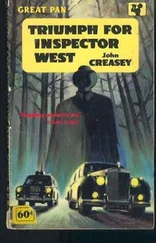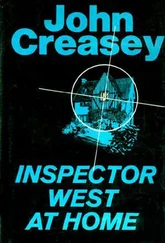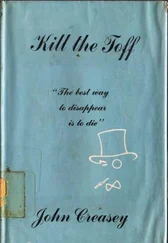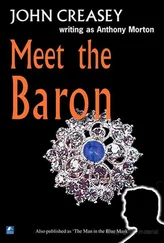John Creasey - Alibi
Здесь есть возможность читать онлайн «John Creasey - Alibi» весь текст электронной книги совершенно бесплатно (целиком полную версию без сокращений). В некоторых случаях можно слушать аудио, скачать через торрент в формате fb2 и присутствует краткое содержание. Жанр: Старинная литература, на русском языке. Описание произведения, (предисловие) а так же отзывы посетителей доступны на портале библиотеки ЛибКат.
- Название:Alibi
- Автор:
- Жанр:
- Год:неизвестен
- ISBN:нет данных
- Рейтинг книги:4 / 5. Голосов: 1
-
Избранное:Добавить в избранное
- Отзывы:
-
Ваша оценка:
- 80
- 1
- 2
- 3
- 4
- 5
Alibi: краткое содержание, описание и аннотация
Предлагаем к чтению аннотацию, описание, краткое содержание или предисловие (зависит от того, что написал сам автор книги «Alibi»). Если вы не нашли необходимую информацию о книге — напишите в комментариях, мы постараемся отыскать её.
Alibi — читать онлайн бесплатно полную книгу (весь текст) целиком
Ниже представлен текст книги, разбитый по страницам. Система сохранения места последней прочитанной страницы, позволяет с удобством читать онлайн бесплатно книгу «Alibi», без необходимости каждый раз заново искать на чём Вы остановились. Поставьте закладку, и сможете в любой момент перейти на страницу, на которой закончили чтение.
Интервал:
Закладка:
“Ah, Mr. West. Thank you very much for calling,” he said. “I’m particularly anxious to see you about a most unexpected development. Could you possibly spare half an hour this afternoon?”
It never rained but it poured. However, he should be away from the Globe ’ s office at about three or three- fifteen, however, and would be fairly near the Allsafe offices in the Strand. There was no reason why he shouldn’t look in, although every reason why Artemeus should not think him at the security company’s beck and call. But making a prestige issue was pointless now.
“I could look in briefly about three-thirty,” he said. “Perhaps a little earlier.”
“How very kind I I’ll be in my office and free from three o’clock onwards, and I won’t make any appointments until you’ve been. I do appreciate it.” Artemeus was almost effusive.
Roger rang off, and called Danizon.
“I want a car right away, for Fleet Street and the Strand,” he said. “I’ll be out for about two hours altogether.”
“Right, sir! I’ll fix it.”
Roger rang off again, and opened the Rapelli file, glanced through it, then put it in his black portfolio. Next he called Abe Court, who was a very brusque man on the telephone, one who always gave the impression that he couldn’t wait to ring off.
“Handsome? . . . I’ve a little more information but not much. Those two men we had on Maisie were diverted —there was an emergency call to Martin’s Bank in the High Street, and they were almost on the spot, so they took a chance. They arrested the bank raiders too—a couple who would have escaped if they hadn’t arrived when they did. Hardly the point, I suppose, two thieves in custody and one life lost, but that killing could have been an inside job. No certainty my chaps were to blame . . . They’re very cut up about it. Want to see them here or at the Yard? I’ve got “em here for you.”
“The Yard,” Roger said. “Four-thirty.”
“Right, Handsome. They’re both good men, don’t forget.”
Roger thought bleakly as he rang off: and Maisie is dead. Nevertheless, he was glad that Abe Court fought for his men, and God knew he was the last man to condemn an officer for using his own judgment in an emergency. He picked up the Fogarty file, which was very thin, and the file on Hamish Campbell, which was not much thicker. He put these in the portfolio, also.
A new Rover was outside the main entrance with a youthful, very blond, young detective officer standing by the door. His colouring reminded Roger vividly of Maisie’s fair hair, so spattered and soaked in blood.
“Good afternoon, sir.” The man opened the door.
“Hallo. Ashe.” Roger got inside, and waited for the other to get at the wheel before adding, “The Globe offices, park the car as near as you can and stand where you can keep me in sight. I might be out in twenty minutes.”
“Right, sir.”
The Globe ’ s offices were nearly brand new, very modern, and in an off-white which nevertheless reflected the glare off the sun. Fleet Street’s narrow roadway was jammed with cars, cabs and huge red buses; one was so used to them. Roger thought, it was difficult to see them as a major cause of London’s traffic problems. The pavements on either side were thronged, too; why did girls look so much prettier and more provocative in sleeveless cotton dresses? There was a space outside the newspaper’s offices, and a doorman in a puce-coloured uniform came forward smartly.
“Superintendent West, sir?”
“Yes.”
“The young lady on the right as you go in will take you up to Mr. Phillipson, sir.”
The “young lady” was in a puce-coloured dress with a very short skirt, and she had long and shapely legs. Her face was more pert than pretty. She led Roger to a small lift, obviously reserved for V.I.P.s, and within two minutes he was in the long, narrow office of the editor. The walls were of marble or mock-marble, the floor was covered from wall to wall in tufted black carpet. A few plaques of past editors were on the walls. At one end of the room was a horseshoe-shaped conference table with ten or twelve places, at the other an enormous desk with
Phillipson behind it, his back to the window, and several comfortable-looking armchairs in front. There were some very modern upright chairs, too.
Phillipson stood up. He was tall, distinguished-looking, and silver-haired, a very lean man in a beautifully cut suit. He did not round the desk but extended his arm across it; after they had shaken hands he motioned to one of the easy chairs.
“Do sit down, Superintendent.”
“May I have one of these?” Roger took an upright chair which was at the side of the desk, and this way he could see Phillipson without having the sun in his eyes; and Phillipson did not have him in such a searching light and at the slight disadvantage of being in a semi-recumbent position.
Phillipson smiled but did not comment.
“I asked you to come because I have a report—a well- authenticated report from a highly reliable source, I may say—which directly concerns you,” he said. “In some cases I would print the story as fair comment, but this one is so personal that, as you said over the telephone, some of the—ah—mud would stick even if we printed a denial the next day. I thought that in view of our somewhat strained relations this week, it might be wise to discuss the report with you first.”
He waited long enough for Roger to comment, but Roger stayed silent. A door near Phillipson opened and a fluffy-haired, middle-aged woman in a dark dress came in with a trolley on which were coffee, brandy, liqueurs and cigars. The soft treatment, Roger reflected drily.
“White or black coffee, sir?”
“Khaki, please.”
“Thank you.” She poured out, offered him sugar, poured out for Phillipson, and left them.
“Brandy?” Phillipson asked.
No thanks,” said Roger. “I haven’t much time and I would like to know the details of this report, please.”
“Very well.” Phillipson picked up a thin sheaf of papers, without glancing at them. “This is prepared by my chief correspondent, who has concentrated on it with three reporters, for two days. I have a copy here for you. It states, very simply, that you are likely to be placed under suspension before the week is out; that, if suspended, you will resign; that some of your somewhat arrogant behaviour in the past few days is due to the fact that you have a most attractive offer of a post in a private security company, at four times your salary in the Metropolitan Police. The implication is that you have deliberately ridden rough-shod over police rules and regulations so as to precipitate a crisis in which you would be dismissed or could resign without any loss of—ah—dignity and respect. If you simply resigned to take a more paying job you would lose the respect not only of your colleagues but of a great many of the general public. If, however, you resigned as a protest against the autocratic methods being adopted at the Yard, largely by the new commissioner, you would retain the goodwill both of police and public.”
Phillipson stopped; and the room seemed hushed. There was not even a rustling of paper, no sound from outside. Then Phillipson stood up, making himself a silhouette against the big window behind him, looked out over Fleet Street and towards Ludgate Circus and St. Paul’s, and went on very quietly, “I hope you agree that you should have an opportunity to refute any of these statements, Superintendent. As this is prepared as a major feature for tomorrow’s issue, it has to be set and carefully proof-read, as well as checked by our legal departments to make sure that any libel read into it can be defended on the grounds of fair comment. That is why I asked you to come this afternoon. What is your comment, Superintendent?”
Читать дальшеИнтервал:
Закладка:
Похожие книги на «Alibi»
Представляем Вашему вниманию похожие книги на «Alibi» списком для выбора. Мы отобрали схожую по названию и смыслу литературу в надежде предоставить читателям больше вариантов отыскать новые, интересные, ещё непрочитанные произведения.
Обсуждение, отзывы о книге «Alibi» и просто собственные мнения читателей. Оставьте ваши комментарии, напишите, что Вы думаете о произведении, его смысле или главных героях. Укажите что конкретно понравилось, а что нет, и почему Вы так считаете.
